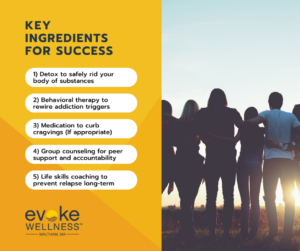You’ve been struggling with prescription drug addiction and don’t know where to turn. Maybe it started innocently, with a doctor’s prescription for painkillers after an injury or surgery. But before you knew it, one pill turned into two, then three. Now you’re taking medications that weren’t even prescribed for you – like Ritalin or Adderall – just to get through the day. You know you need help but are afraid of what treatment might involve. The good news is there are programs tailored specifically for prescription drug addiction that can help you get your life back on track. With the right treatment plan, you can beat this.
What Are the 5 Goals of Addiction Treatment?
1. Achieve Abstinence
The primary goal is to help the person stop using addictive substances completely. This involves breaking the physical and psychological dependence through detox, therapy, and support systems. Abstinence allows the brain and body to heal from addiction’s damaging effects.
2. Prevent Relapse
Recovery is an ongoing process with a high risk of relapse. Addiction treatment equips individuals with coping strategies, lifestyle changes, and relapse prevention plans to maintain sobriety long-term. Support groups play a vital role here.
3. Improve Life Functionality
Substance abuse takes a toll on relationships, work, health and overall well-being. Treatment helps restore functionality by addressing root issues, building healthy habits, and improving decision-making skills. The goal is a productive, self-directed life.
4. Address Co-Occurring Disorders
Many dealing with addiction also struggle with mental health issues like depression, anxiety or PTSD. Integrated treatment plans tackle these co-occurring disorders simultaneously through combined therapies and medications as needed.
5. Provide a Support Network
No one overcomes addiction alone. Building a circle of non-judgmental supporters is crucial – be it through counselors, sponsors, sober friends or family. This supportive network encourages accountability and prevents isolation.
The path is challenging but absolutely attainable with commitment to these evidence-based treatment goals tailored to each individual’s unique needs. Patience and perseverance are key to achieving lasting recovery.
What Are Three Options for Drug Abuse Treatment?
1. Inpatient Rehab Programs
For those struggling with severe addiction, inpatient or residential treatment can provide intensive 24/7 care and monitoring. These programs typically last 30-90 days and involve living on-site at the facility. You’ll receive medical detox support, counseling, group therapy, and learn coping strategies. A highly structured environment away from triggers can help you build a strong foundation for recovery.
2. Outpatient Treatment
If your addiction is less severe or you can’t take time away for inpatient care, outpatient programs offer flexibility. You live at home but attend regular therapy sessions, support groups, and checkups at the treatment center. Lower intensity lets you maintain work/family obligations. Intensive outpatient programs (Night Treatments) provide a higher level of treatment, often meeting 3-5 times per week.
3. Medication-Assisted Treatment
Certain prescription medications like buprenorphine, methadone or naltrexone can help reduce cravings and withdrawal symptoms from opioid or alcohol addiction. Combined with counseling and behavioral therapies, medication-assisted treatment (MAT) can improve recovery outcomes. MAT helps stabilize your brain chemistry and prevents relapse while you work through the root causes of your addiction.
What Is a Treatment Plan in Addiction Counseling?
A treatment plan is your roadmap to recovery from addiction. It’s a customized program designed just for you by addiction professionals to meet your unique needs.
Getting You Where You Need to Go
Think of it like a GPS routing your journey – except this is for navigating sobriety. The plan lays out all the steps, therapies, and support to guide you there, one milestone at a time.
It’s an evolving game plan, too. Your counselor will check in regularly to see how you’re progressing, adjust things as needed, and keep you motivated along the way.
Key Ingredients for Success
While every plan is personalized, some common elements include:
The right mix is carefully selected to tackle your specific substance issues and any co-occurring mental health needs.
Why It Matters
With a solid treatment plan, you don’t have to white-knuckle recovery alone. You get a clear path forward and backup from professionals every step of the way. That greatly increases your odds of beating addiction for good.
Addiction Therapy Programs
Group Counseling
You’re not alone in this battle against addiction. Group therapy programs connect you with others facing similar challenges. This supportive environment encourages open discussion and advice sharing. Hearing different perspectives can provide insight into your own situation.
Individual Therapy
One-on-one counseling digs deeper into your personal struggles and triggers. A therapist guides you through coping strategies tailored just for you. Expressing your thoughts and feelings openly, without judgment, promotes self-awareness and healing.
Holistic Therapies
Creative outlets like art, music, or yoga can be valuable supplements to traditional talk therapy. Expressing yourself through holistic therapy fosters mindfulness and emotional release. Many find holistic activities to be calming and rejuvenating during recovery.
Aftercare Planning
Recovery doesn’t end after completing a program – it’s an ongoing journey. Aftercare resources like sober living homes, alumni support groups, or outpatient therapy ensure you have continued care. This transitional support lowers relapse risks.
No one path fits everyone. The most effective addiction programs incorporate multiple evidence-based therapies tailored to your needs. Be open to exploring different treatment options that resonate with you.
Addiction Treatment Program
Comprehensive Care
When dealing with prescription drug addiction, a comprehensive treatment approach is crucial. This means addressing not just the physical dependence, but also the underlying psychological and emotional factors contributing to the addiction. A good program will combine medical detox, counseling, therapy, and support groups to tackle every aspect of your struggle.
Personalized Plans
One size rarely fits all when it comes to addiction treatment. The best programs tailor their approaches to each individual’s needs, circumstances, and personal history with substance abuse. Your treatment plan may involve different combinations of medication, behavioral therapies, holistic practices, and lifestyle changes based on your specific situation.
Continuous Support
Recovering from prescription drug addiction is an ongoing process that requires long-term support and aftercare. Look for programs that provide resources like sober living facilities, alumni networks, and community integration services to help prevent relapse and establish a sustainable sober lifestyle after completing the initial treatment phase.
Family Involvement
Addiction impacts entire families, not just the addicted individual. Top-tier programs recognize this and make family education, counseling, and involvement a central part of their approach by offering Family Therapy Programs. With loved ones’ support, accountability, and understanding of the recovery process, your chances of success increase dramatically.
The most effective prescription drug addiction treatment leaves no stone unturned. By combining medical expertise, mental health care, and holistic wellness practices within a supportive community setting, these programs give you the comprehensive toolkit needed to reclaim your life.
Substance Abuse Treatment Program
A Compassionate Approach
When it comes to prescription drug addiction, it’s crucial to approach treatment with empathy and understanding. These addictions often stem from underlying mental health issues or personal struggles. A reputable treatment program takes a holistic, non-judgmental approach, focusing on healing the root causes.
Customized Treatment Plans
No two journeys towards recovery are the same. Quality substance abuse programs tailor treatment to each individual’s unique needs and circumstances. This could involve a combination of therapies, counseling, medication-assisted treatment, and lifestyle changes. The goal is long-term sobriety and improved well-being.
Comprehensive Support System
Overcoming addiction requires a strong support network. Top-tier programs provide around-the-clock care from qualified professionals, including medical staff, therapists, and peer support specialists. They also equip patients and families with coping strategies and resources for life after treatment.
Continuum of Care
Recovery is an ongoing process, not a one-time event. Effective programs emphasize long-term aftercare through outpatient services, sober living arrangements, alumni networks, and community resources. This continuum of care helps prevent relapse and promotes lasting recovery.
With commitment and the right treatment approach, overcoming prescription drug addiction is absolutely possible. A quality substance abuse program can guide you through this challenging journey with compassion and expert support every step of the way.
FAQ: Addiction Treatment Program
What are the different types of treatment programs?
There are various treatment approaches for addiction, tailored to individual needs. Inpatient or residential programs provide intensive, round-the-clock care. Outpatient programs allow more flexibility with work or school. Medication-assisted treatments use FDA-approved drugs to reduce cravings and withdrawal symptoms.
Behavioral therapies like cognitive-behavioral therapy (CBT) help modify attitudes and behaviors related to substance abuse. Support groups foster community and accountability. The most effective approach often combines different evidence-based therapies.
How long does treatment take?
Treatment duration depends on multiple factors like substance, severity of addiction, co-occurring disorders, etc. Most experts recommend at least 90 days of treatment for the best outcomes. However, recovery is an ongoing process that may require continual maintenance via support groups, individual counseling or medication.
The first few months lay the foundation, but long-term follow-up care is crucial to preventing relapse. Be prepared for a long journey, but focus on making consistent progress – not perfection.
What if I relapse during treatment?
Relapse is common and doesn’t mean failure – it’s a temporary setback on the road to recovery. Quality programs have procedures to get you back on track quickly. They’ll adjust the treatment plan as needed, increase support, explore relapse triggers, and renew motivation.
The key is to be honest, remain hopeful, and persist through challenges. With commitment and the right help, many overcome multiple relapses before achieving long-term sobriety.
Conclusion
So there you have it. Prescription stimulants like Ritalin and Adderall can be helpful when used properly, but they also carry risks. If you or someone you love is struggling with dependence or addiction, know that you’re not alone. Millions of Americans battle prescription drug abuse every year. But help is available if you’re ready to take that first step. Treatment programs tailored to stimulant addiction can provide the tools and support needed for lasting recovery. With patience, hard work, and the right treatment team on your side, a better life free from addiction is possible. Don’t lose hope – you have the power to turn things around, one day at a time. Your journey to health and healing is waiting.
Begin Your Journey with Evoke Wellness at Waltham
If you or a loved one is considering addiction treatment, Evoke Wellness at Waltham invites you to contact us. Our compassionate team is ready to answer your questions, discuss your needs, and help you take the first steps toward recovery. At Evoke Wellness, you will find more than just a treatment program – you’ll discover a community dedicated to your wellness and success. Together, let’s embrace the journey to recovery and the promise of a new beginning. Call us at (833) 287-7223 today or reach out online.



